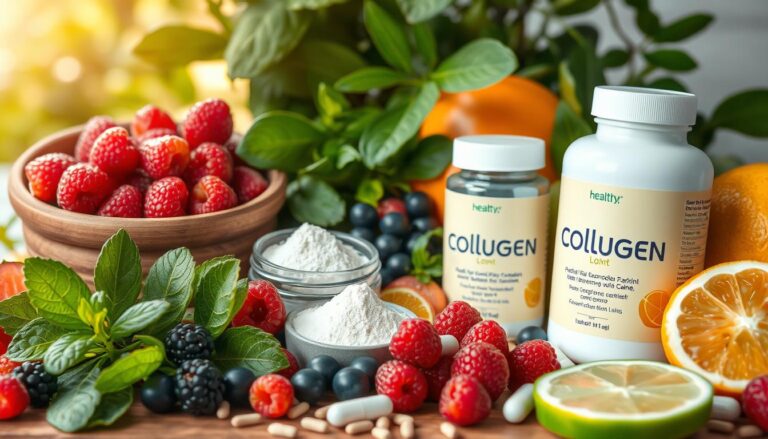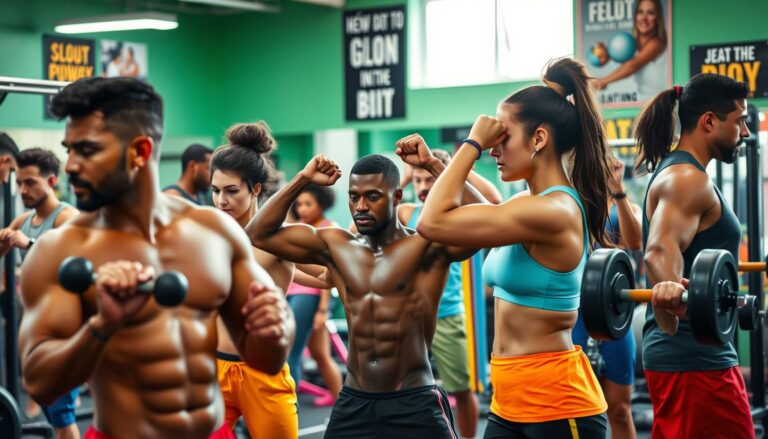Stay Hydrated for Intense Workouts: Expert Tips
As I delve into the world of fitness, I’ve come to realize the importance of staying hydrated during intense workouts. Proper hydration is essential for optimal performance, and it can make a significant difference in your overall fitness journey. When it comes to how to stay hydrated during intense workouts, there are several hydration tips to keep in mind. Staying hydrated is crucial, and I’m excited to share my knowledge with you.
Whether you’re a professional athlete or a fitness enthusiast, understanding the basics of hydration can help you achieve your fitness goals. I’ll be discussing expert tips and strategies for staying hydrated, including the best ways to hydrate and prevent dehydration. By following these tips, you’ll be able to stay hydrated and perform at your best.
Introduction to Hydration
Now, let’s get started on our journey to understanding the importance of hydration. With the right hydration tips, you can take your workouts to the next level and achieve your fitness goals. Remember, staying hydrated is key to optimal performance, and it’s essential to learn how to stay hydrated during intense workouts.
Key Takeaways
- Staying hydrated is essential for optimal performance during intense workouts
- Proper hydration can make a significant difference in your overall fitness journey
- There are several hydration tips to keep in mind when working out
- Understanding how to stay hydrated during intense workouts is crucial for athletes and fitness enthusiasts
- Preventing dehydration is key to achieving your fitness goals
- Hydration tips can help you perform at your best and take your workouts to the next level
Understanding Why Hydration Makes or Breaks Your Workout
As I delve into the world of fitness, I’ve come to realize that hydration plays a crucial role in exercise performance. The best way to hydrate is by drinking plenty of water before, during, and after exercise. Water intake during exercise is essential to prevent dehydration, which can significantly impact your performance. Dehydration can cause fatigue, dizziness, and decreased endurance, making it challenging to complete even the simplest of workouts.
Preventing dehydration is crucial, and it starts with understanding the science behind exercise and fluid loss. When you exercise, your body loses fluids through sweat, which can lead to dehydration if not properly replenished. To stay hydrated, it’s essential to drink water regularly during exercise. The key is to find a balance between water intake and electrolyte replenishment.
The Science Behind Exercise and Fluid Loss
Exercise and fluid loss are closely linked. When you exercise, your body temperature rises, causing you to sweat. Sweat is your body’s way of cooling down, but it also leads to fluid loss. If you don’t replenish these lost fluids, you risk dehydration. The best way to prevent dehydration is to drink water regularly during exercise, making sure to balance your water intake with electrolyte replenishment.
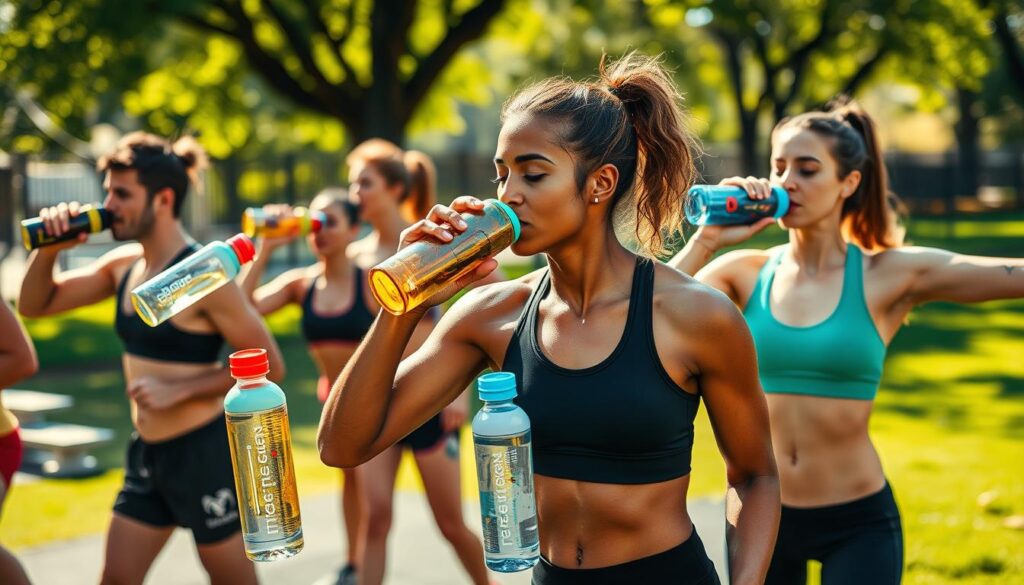
How Dehydration Impacts Performance
Dehydration can significantly impact your performance, causing fatigue, dizziness, and decreased endurance. Even mild dehydration can cause a decline in performance, making it challenging to complete even the simplest of workouts. To prevent dehydration, it’s essential to drink water regularly during exercise and replenish lost electrolytes.
| Hydration Level | Performance Impact |
|---|---|
| Mild Dehydration | Decline in performance, fatigue, and dizziness |
| Moderate Dehydration | Significant decline in performance, decreased endurance, and increased risk of injury |
| Severe Dehydration | Severe decline in performance, increased risk of serious injury, and potentially life-threatening complications |
By understanding the importance of hydration and taking steps to prevent dehydration, you can optimize your performance and achieve your fitness goals. Remember to drink water regularly during exercise and replenish lost electrolytes to stay hydrated and perform at your best.
How to Stay Hydrated During Intense Workouts
Staying hydrated while working out is crucial for optimal performance and overall health. The importance of hydration cannot be overstated, as it directly affects our body’s ability to regulate temperature, transport nutrients, and remove waste products. When we exercise, our body loses water and essential minerals, such as sodium and potassium, through sweat.
To stay hydrated during intense workouts, it’s essential to monitor our body’s signs of dehydration. One way to do this is by checking the color of our urine – if it’s dark yellow or amber-colored, it may be a sign that we need to drink more water. We can also weigh ourselves before and after exercise to track any significant changes in weight, which can indicate dehydration.
Here are some tips to help us stay hydrated while working out:
- Drink water regularly throughout the day, not just during exercise
- Monitor our urine output and color to ensure we’re staying hydrated
- Adjust our hydration plan based on the intensity and duration of our workout
By prioritizing hydration and staying mindful of our body’s needs, we can optimize our workout performance and reduce the risk of dehydration and related health issues. Remember, the importance of hydration is not just limited to exercise – it’s essential for our overall health and well-being.
| Hydration Tips | Benefits |
|---|---|
| Drink water regularly | Helps regulate body temperature and transport nutrients |
| Monitor urine output | Indicates hydration status and helps prevent dehydration |
| Adjust hydration plan | Optimizes workout performance and reduces risk of dehydration |
Pre-Workout Hydration Strategy
As I prepare for my workout, I know that hydrating properly is essential for optimal performance. Staying hydrated during workouts is crucial to avoid dehydration and maintain energy levels. To achieve this, I create a personalized hydration plan, taking into account factors such as the type and intensity of my workout, the climate, and my individual needs.
A well-planned pre-workout hydration strategy involves timing my water intake, electrolyte loading techniques, and choosing the right drinks before different types of workouts. Here are some tips to help you create your own hydration plan:
- Drink water 1-2 hours before your workout to allow for proper digestion and absorption.
- Include electrolyte-rich foods or supplements in your pre-workout meal to help regulate fluid balance.
- Choose a sports drink that contains essential electrolytes, such as sodium and potassium, if you’re engaging in high-intensity or long-duration workouts.
By following these tips and staying hydrated during workouts, you can improve your performance, reduce the risk of dehydration, and support your overall health and well-being.
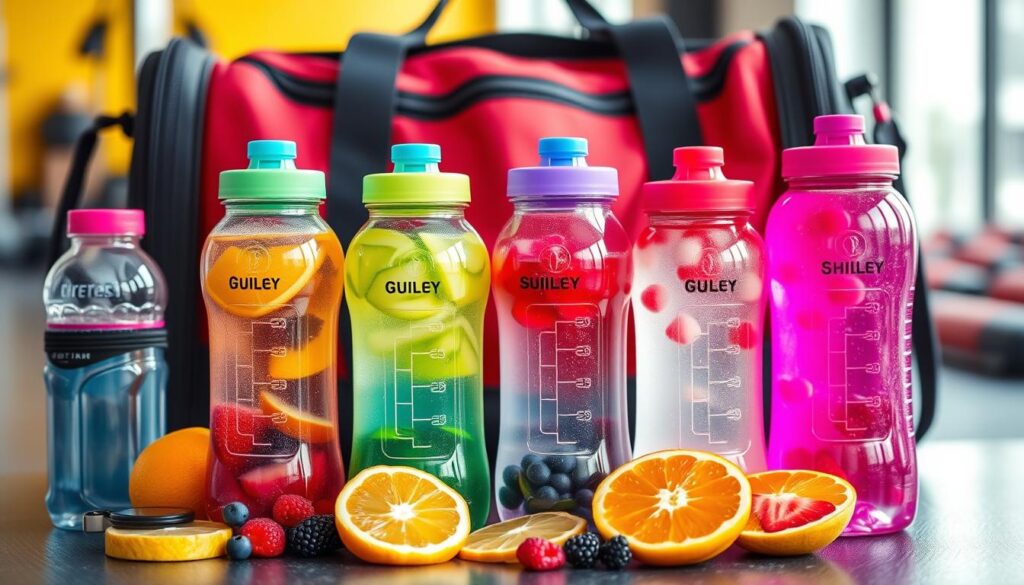
Remember, a well-planned pre-workout hydration strategy is key to achieving your fitness goals. By prioritizing hydrating properly and staying hydrated during workouts, you can unlock your full potential and reach new heights in your fitness journey.
Signs Your Body Needs More Fluids
As I continue on my fitness journey, I’ve learned that staying hydrated is crucial for optimal performance. One of the most important hydration tips I’ve picked up is to recognize the signs that my body needs more fluids. If I’m not careful, I can easily become dehydrated, which can lead to a range of issues, from fatigue to dizziness.
To avoid this, I make sure to monitor my body’s hydration levels by tracking my urine output, monitoring my energy levels, and paying attention to my body’s thirst signals. Here are some key signs to look out for:
- Dark urine: If my urine is a deep yellow or amber color, it’s a sign that I need to drink more water.
- Fatigue: If I’m feeling tired or sluggish, it could be a sign that I’m not getting enough fluids.
- Dizziness: If I feel lightheaded or dizzy, it’s a sign that my body needs more fluids to function properly.
By paying attention to these signs and following these hydration tips, I can ensure that I’m staying hydrated and performing at my best. Whether I’m hitting the gym or just going about my daily routine, proper hydration is essential for maintaining my overall health and wellbeing.
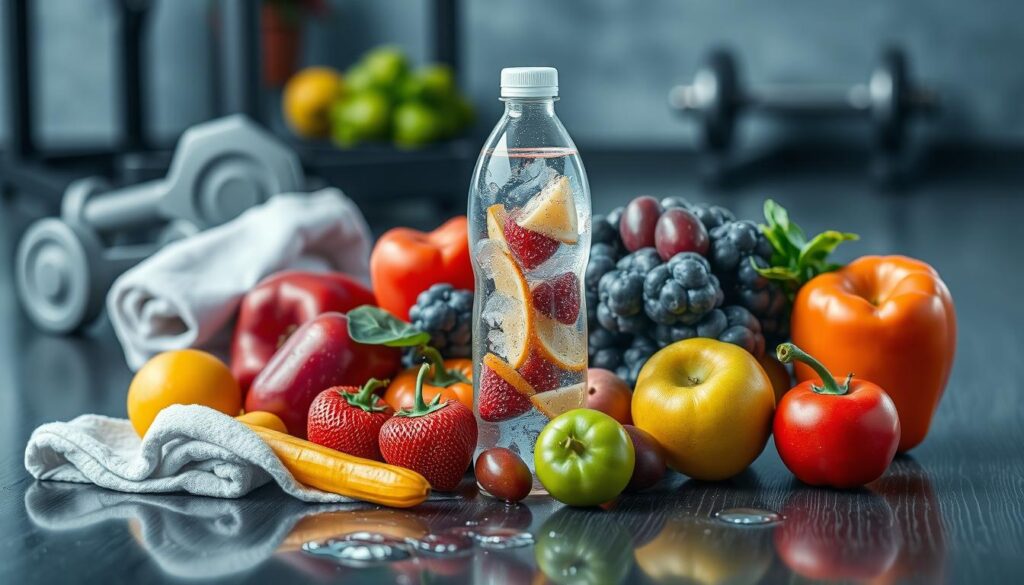
Remember, it’s all about listening to your body and giving it what it needs to function properly. By following these simple hydration tips and being mindful of the signs that my body needs more fluids, I can stay on top of my game and achieve my fitness goals.
Best Hydration Drinks for Maximum Performance
When it comes to water intake during exercise, choosing the right hydration drink can make a significant difference in your performance. As someone who’s passionate about fitness, I’ve learned that preventing dehydration is crucial to achieving my goals. In this section, we’ll explore the best hydration drinks for maximum performance, including water, sports drinks, and natural hydration alternatives.
To stay hydrated, it’s essential to consider the intensity and duration of your workout. For low-to-moderate intensity exercises, water is usually sufficient. However, for high-intensity or long-duration workouts, you may need a sports drink to replenish lost electrolytes.
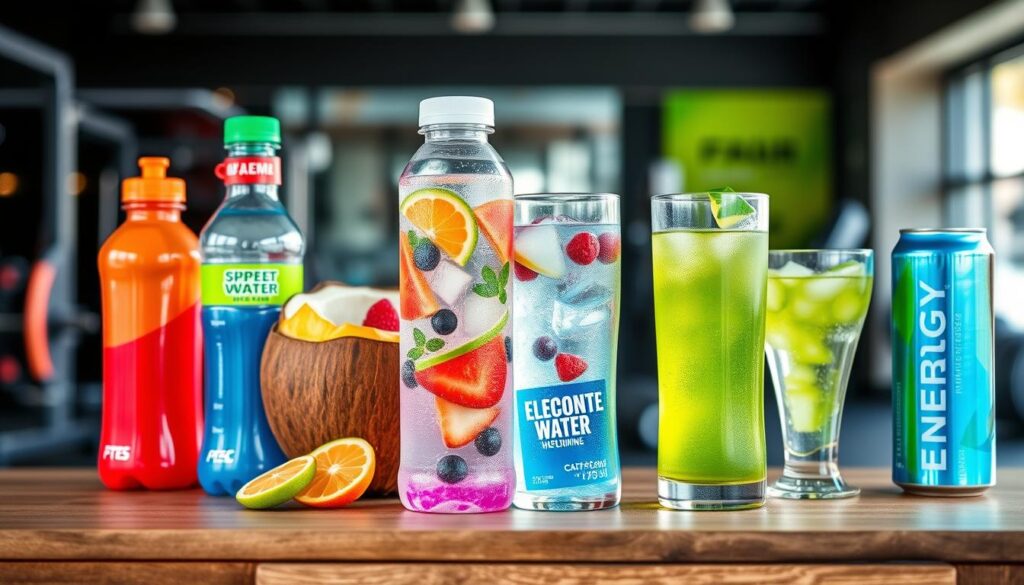
- Type of workout: high-intensity, low-intensity, or long-duration
- Climate: hot, cold, or humid
- Personal preferences: taste, calories, and ingredients
By considering these factors and choosing the right hydration drink, you can optimize your performance, prevent dehydration, and achieve your fitness goals. Remember to always listen to your body and adjust your hydration strategy accordingly.
My Proven Hydration Timeline for Different Workout Intensities
To stay hydrated during intense workouts, it’s essential to have a personalized hydration plan. Staying hydrated is crucial for optimal performance, and I’ve developed a proven hydration timeline to help you achieve your fitness goals.
Here’s a step-by-step guide on how to stay hydrated during intense workouts:
- Pre-workout hydration: Drink 16-20 ounces of water 1-2 hours before your workout
- Intra-workout hydration: Drink 7-10 ounces of water every 10-15 minutes during your workout
- Post-workout hydration: Drink 16-20 ounces of water within 30 minutes after your workout
Remember, staying hydrated is a continuous process, and it’s essential to adjust your hydration plan based on the intensity and duration of your workout. By following this proven hydration timeline, you’ll be able to perform at your best and achieve your fitness goals.
| Workout Intensity | Hydration Plan |
|---|---|
| Low-intensity | Drink 8-10 ounces of water every 30 minutes |
| Medium-intensity | Drink 10-12 ounces of water every 20 minutes |
| High-intensity | Drink 12-15 ounces of water every 15 minutes |
Recovery and Rehydration: The Post-Workout Window
After an intense workout, it’s essential to focus on recovery and rehydration to prevent dehydration and support muscle growth. The best way to hydrate during this period is by consuming a mix of protein and carbohydrates, which helps to replenish energy stores and repair muscle tissue.
I recommend creating a recovery drink recipe that includes a balance of these nutrients, along with electrolytes such as sodium and potassium. This can be achieved by mixing a sports drink with a source of protein, such as milk or protein powder, and adding some carbohydrates like fruit or honey.
Monitoring Your Hydration Status
To ensure you’re staying hydrated, it’s crucial to monitor your urine output and body weight. If your urine is dark yellow or you’re not urinating frequently enough, it may be a sign that you’re not consuming enough fluids. Additionally, keeping track of your body weight can help you identify any significant changes that may indicate dehydration.
Some tips for preventing dehydration include:
- Drinking at least 16-20 ounces of fluid 1-2 hours before exercise
- Consuming a sports drink or electrolyte-rich beverage during intense or long-duration workouts
- Eating hydrating foods, such as watermelon or cucumbers, after exercise
By following these tips and creating a personalized recovery drink recipe, you can ensure you’re giving your body the best chance to recover and rehydrate after a workout, which is the best way to hydrate and prevent dehydration.
Common Hydration Mistakes to Avoid
When it comes to staying hydrated while working out, many of us make mistakes that can hinder our performance and overall health. Understanding the importance of hydration is crucial to avoid these common mistakes.
Some common hydration mistakes to avoid include:
- Underhydrating, which can lead to decreased performance and increased risk of injury
- Overhydrating, which can lead to an imbalance of electrolytes in the body
- Neglecting electrolyte intake, which can lead to muscle cramps and fatigue
To avoid these mistakes, it’s essential to monitor your urine output, weigh yourself before and after exercise, and adjust your hydration plan based on the intensity and duration of your workout. By doing so, you can ensure you’re staying hydrated while working out and maintaining the importance of hydration for optimal performance.
By being mindful of these common hydration mistakes and taking steps to avoid them, you can stay on top of your game and maintain your overall health and well-being.
Conclusion: Making Proper Hydration Your Fitness Priority
As we wrap up this in-depth exploration of hydration strategies, I encourage you to make proper hydration a top priority in your fitness journey. By implementing the tips and techniques we’ve covered, you’ll be able to stay hydrated during even the most intense workouts, unlocking your full potential and achieving your goals.
Remember, staying hydrated is not just about quenching your thirst – it’s about fueling your body with the essential fluids and minerals it needs to perform at its best. Whether you’re a seasoned athlete or just starting your fitness journey, incorporating a personalized hydration plan can make all the difference.
So, don’t let dehydration hold you back any longer. Experiment with different hydration methods, listen to your body, and make adjustments as needed. With dedication and a focus on proper hydration, you’ll be well on your way to reaching new heights in your fitness endeavors. Here’s to a hydrated, healthy, and high-performing you!
FAQ
How important is hydration during intense workouts?
Proper hydration is absolutely essential for optimal performance during intense workouts. When you exercise, your body loses fluids through sweat, which can lead to dehydration if not properly replenished. Dehydration can significantly impact your performance, causing fatigue, dizziness, and decreased endurance.
What are the key hydration minerals my body needs during exercise?
In addition to water, your body also needs key electrolytes like sodium, potassium, and magnesium to maintain proper hydration. These minerals help regulate fluid balance, muscle function, and nerve transmission, all of which are crucial for exercise performance.
How can I tell if I’m not getting enough fluids during my workout?
There are several signs that your body needs more fluids, including dark urine, fatigue, dizziness, and a rapid heart rate. It’s important to monitor your urine output and pay attention to how your body feels during and after exercise to ensure you’re staying properly hydrated.
What’s the best way to hydrate before an intense workout?
Timing your water intake and utilizing electrolyte loading techniques are key for pre-workout hydration. I recommend drinking water consistently throughout the day leading up to your workout, and consuming an electrolyte-rich drink 30-60 minutes before starting your exercise routine.
Should I choose water or sports drinks for hydration during my workout?
The choice between water and sports drinks depends on the intensity and duration of your workout. For shorter, less intense sessions, water is often sufficient. However, for longer or more intense workouts, sports drinks that contain carbohydrates and electrolytes can help you stay hydrated and maintain your energy levels.
How can I create a personalized hydration timeline for different workout intensities?
Developing a personalized hydration timeline is key. I recommend drinking 16-24 ounces of water in the 2-4 hours before your workout, consuming 8-12 ounces of fluid every 15-20 minutes during your workout, and drinking 16-24 ounces of a recovery drink within 30 minutes of finishing your session.
What are some common hydration mistakes I should avoid?
Some of the most common hydration mistakes include underhydrating, overhydrating, and neglecting electrolyte intake. It’s important to monitor your body’s signals, weigh yourself before and after exercise, and adjust your hydration plan accordingly to ensure you’re staying properly hydrated.
